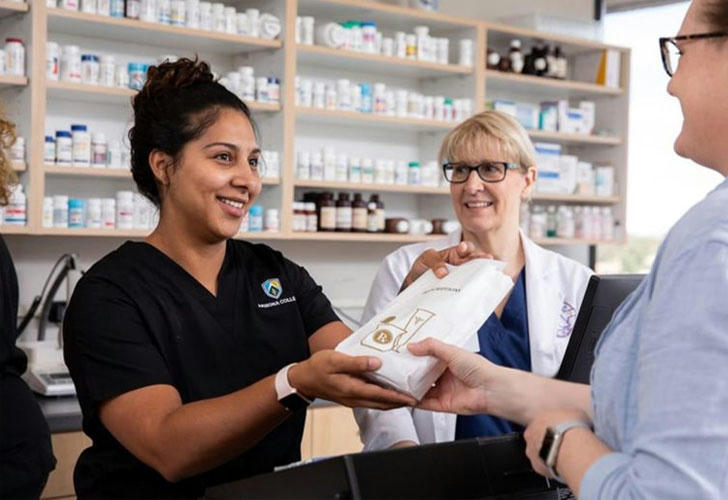Fast-Track Your Pharmacy Technician Career: Top Courses & Must-Have Study Tools
Thinking about a rewarding healthcare career without spending years in school? Pharmacy Technician courses offer a fast-track into the world of prescriptions, patient care, and pharmacy operations. In just a few months, you can gain the knowledge and confidence to assist pharmacists, manage medication inventories, and serve patients at the counter. Here’s your straightforward guide to choosing the right program in 2025—and the essential study tools you’ll use every step of the way.

1. Why Become a Pharmacy Technician?
Stable Demand
The aging population and expanding healthcare needs drive steady demand for skilled pharmacy technicians.
Competitive Pay
Entry-level technicians earn well above minimum wage—and can increase earnings with certifications and on-the-job experience.
Short Training Path
Many programs take just 3–6 months to complete, often with online theory and local hands-on labs.
Career Growth
Pharmacy techs can specialize in compounding, IV preparation, or long-term care, and even advance toward supervisory roles.
If you’re detail-oriented, enjoy helping people, and want a swift path into healthcare, pharmacy technician training is a smart move.
2. Choosing the Right Pharmacy Technician Course
With dozens of options—community colleges, career schools, and online academies—how do you pick? Focus on:
Accreditation & Certification Prep
Look for programs accredited by ACPE or recognized by your state board, and courses that prepare you for the PTCB (Pharmacy Technician Certification Board) exam.
Blended Learning Format
Programs combining online lectures with local lab sessions let you study theory at your pace and practice dispensing, compounding, and billing under supervision.
Hands-On Experience
Courses that partner with hospitals or retail pharmacies for externships give you real-world exposure—making job hunting easier.
Career Services
Job placement assistance, resume reviews, and interview prep can be invaluable when you’re ready to launch your career.
Flexible Scheduling
If you’re working or caring for family, choose courses offering evening or weekend labs, plus 24/7 access to online materials.
Most reputable programs run 12–24 weeks, include mock labs, and give you the confidence to tackle your first day behind the pharmacy counter.
3. Core Curriculum & Skills You’ll Learn
Every pharmacy technician course covers foundational and advanced topics:
3.1 Pharmacy Law & Ethics
- Federal and state regulations
- Patient privacy (HIPAA)
- Controlled substance handling
3.2 Pharmaceutical Mathematics
- Dosage calculations
- Converting units (mg to g, mL to L)
- IV infusion rates
3.3 Medication Preparation & Dispensing
- Counting tablets and measuring liquids
- Label generation and verification
- Compounding basics (non-sterile)
3.4 Pharmacy Software & Billing
- Electronic health records (EHR) systems
- Insurance claim processing and adjudication
- Inventory management
3.5 Communication & Customer Service
- Patient counseling basics
- Confidential phone and in-person interactions
- Handling insurance and payment questions
By the end of the program, you’ll be proficient in both the science and the customer-facing side of pharmacy work.
4. Essential Tools & Study Aids
Success in a pharmacy technician course depends on practice and the right resources. Here are some must-have products:
PTCB Exam Review Book
Comprehensive review of all certification domains—law, calculations, pharmacy operations—and hundreds of practice questions.Pharmaceutical Calculator
A handheld calculator designed for healthcare math, with dosage-specific functions and unit conversions.Flashcards for Drug Names & Classifications
Portable sets covering generic/brand names, drug classes, common side effects, and routes of administration.Pill Counting Tray & Spatula
Practice counting mock tablets accurately—builds muscle memory before your first lab session.Compounding Kit
Scales, mortar & pestle, graduated cylinders, and spatulas to rehearse non-sterile compounding at home or in lab.Protective Lab Coat & Nitrile Gloves
Stay professional and maintain hygiene during hands-on labs and externships.Medical Abbreviations & Terminology Guide
Quick reference guide for prescriptions, charting, and verbal communication with pharmacists.Pocket Reference Handbook
A compact drug interaction chart, measurement conversions, and emergency protocols—ideal for quick look-ups in labs.Anki or Quizlet Subscription
Digital flashcard apps let you customize study decks, track progress, and review on the go.Digital Note-Taking App
Organize lecture notes, lab images, and study schedules in one place—sync across devices for instant access.
Pair these tools with your course materials, and you’ll reinforce classroom learning through hands-on practice and spaced repetition.
5. Study Tips & Strategies
Create a Consistent Schedule
Block daily study times for reading, practice calculations, and flashcard review. Even 20 minutes a day adds up.
Practice Drug Calculations Daily
Set up mock problems: calculate IV drip rates, tablet dosages, and pediatric doses. Accuracy builds confidence.
Form a Study Group
Share flashcards, quiz each other on pharmacy law, and discuss tricky compounding scenarios. Explaining concepts to peers cements your knowledge.
Use Mnemonics for Drug Names
Acronyms and rhymes help remember similarly named drugs (e.g., “Lisinopril lowers pressure in the pill” for antihypertensives).
Simulate Real-World Labs
Count pills into cups, prepare mock syrups, and run through label-printing exercises under timed conditions.
Leverage Video Tutorials
Short videos demonstrating compounding techniques or pharmacy software navigation can clarify complex steps.
Staying engaged, organized, and proactive turns a challenging curriculum into an enjoyable learning journey.
Conclusion
A Pharmacy Technician course is your fast track into a stable, in-demand healthcare role. With accredited programs, hands-on labs, and the study tools above—like review books, calculators, and flashcards—you’ll walk into your externship and exam with confidence. Ready to jumpstart your career in 2025? Choose a course, gather your toolkit, and get set to make a real difference in patient care.
Happy studying and good luck on your journey to becoming a certified pharmacy technician!
